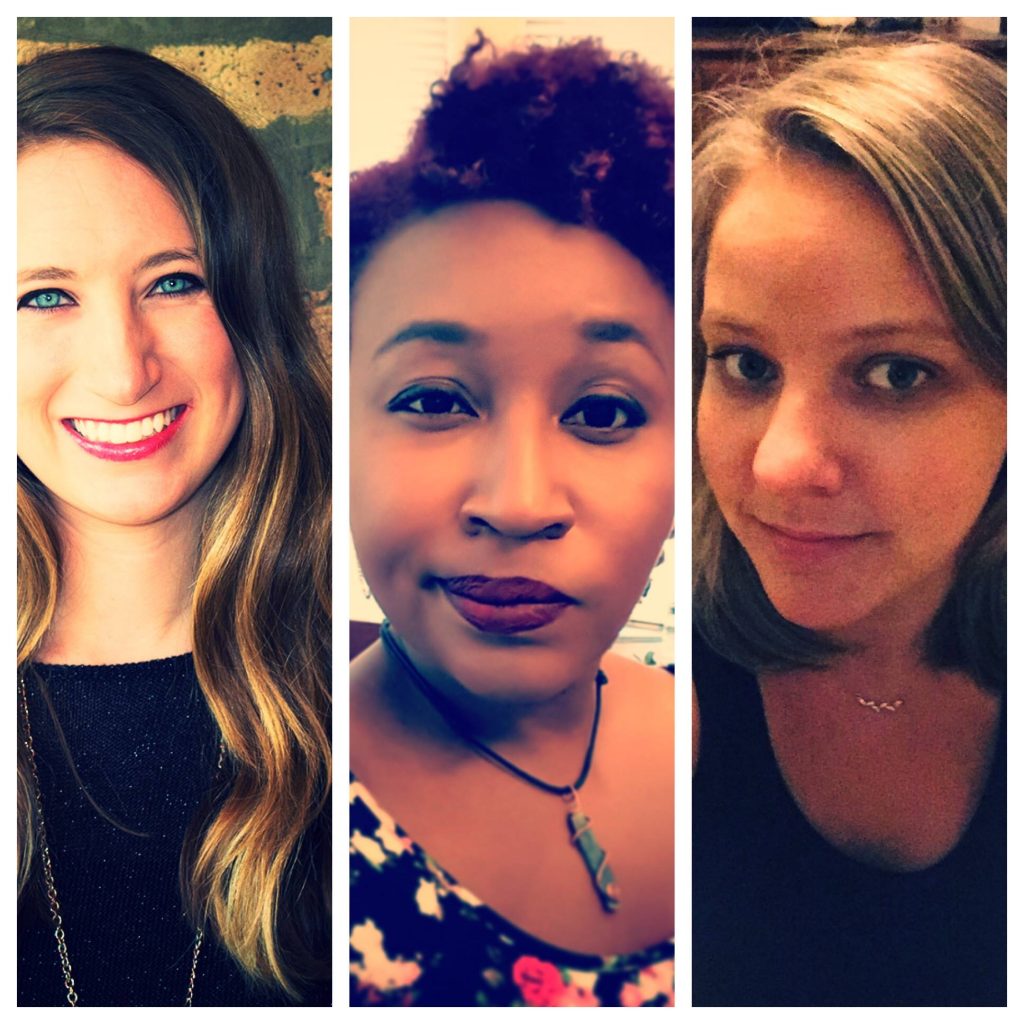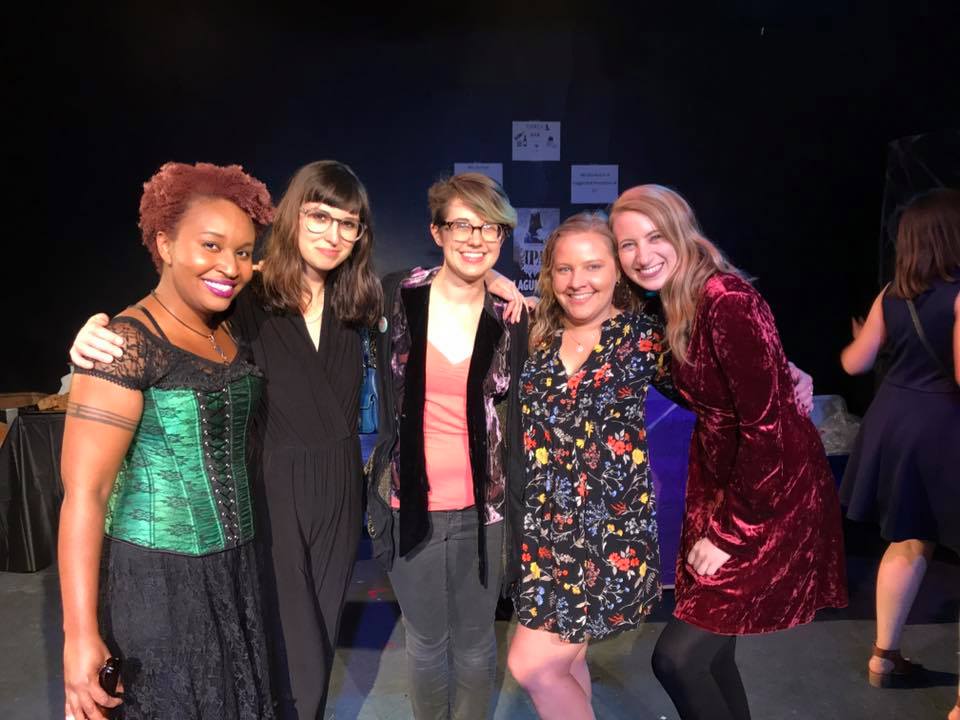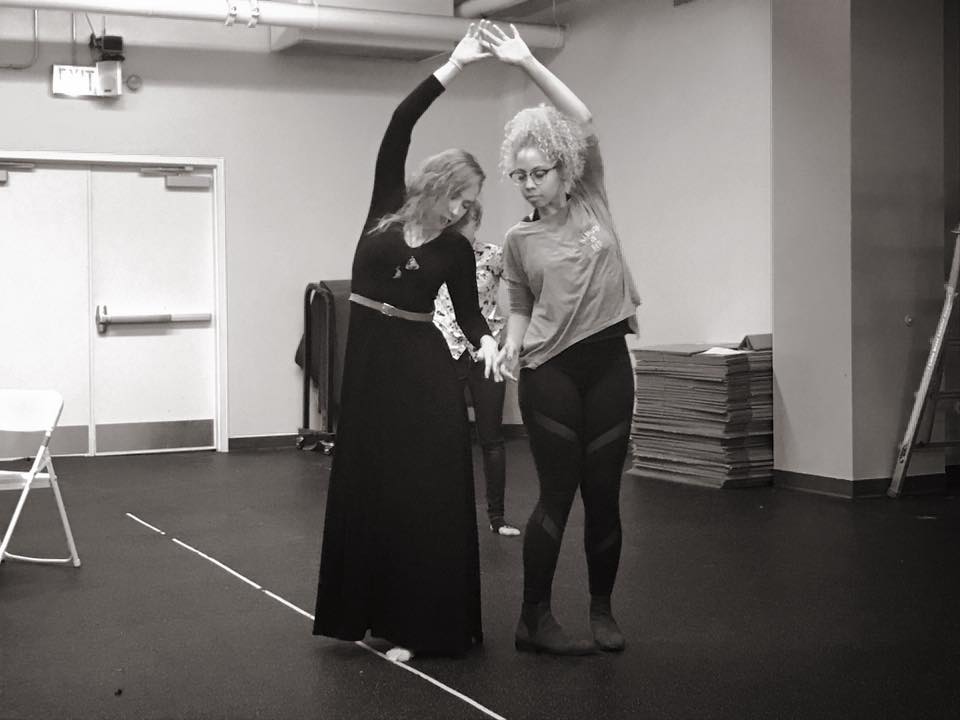
How to be F.I.E.R.C.E.
F.I.E.R.C.E. (Females Inspiring Equality, Radicalization, Collective Action, and Education through Art) is a nonprofit performing arts collective created by three graduate students in the Master of Arts Management program at Columbia College Chicago – Caroline Ruark, Sheridan Singleton and Beth Zupec.
What’s the story behind “F.I.E.R.C.E.”?
Caroline: F.I.E.R.C.E. was an idea that blossomed in the Spring of 2017. Angelo Luciano, a Columbia professor (now retired) who taught Accounting in the Business and Entrepreneurship department, was lecturing to our cohort about how we needed to figure out what electives we wanted to take in our second year. We were all having heart palpitations because we had NO IDEA what we wanted to do and who actually thinks that far ahead… and as I was sitting there, freaking out along with the rest of my classmates, it occurred to me that I wanted to learn how to build a theatre company from the ground up. So, I turned to my colleagues, Sheridan and Beth, and exclaimed, “HEY! THIS IS CRAZY, BUT DO YOU WANT TO START A THEATRE COMPANY WITH ME!?” Of course they said yes… so, F.I.E.R.C.E. cultivated into a year-long independent project and a professional entrepreneurial endeavor pioneered by the three of us.
The name “F.I.E.R.C.E.” is an acronym that stands for Females Inspiring Equality, Radicalization, Collective Action and Education through Art. The adjective “fierce” was particularly appealing to me for two reasons, 1) the negative and sometimes illicit reputation the word receives (especially when assigned to a woman), and 2) the duality of the term (“aggressive” vs. “strong and powerful”). We fully intend to resurrect the word so that when people think of F.I.E.R.C.E. they will think of confident, strong females working to enact change in their community through the power of performance.
Our hope is that F.I.E.R.C.E. becomes not just another Chicago theatre company, but becomes a community where all individuals (regardless of gender, race, sexual orientation, etc.) can join together to work toward a common cause. We want our productions to spark conversations, inspire change and bring people together.
Why did you decide to create your own theatre company instead of working for a current organization?
Caroline: Like I stated above, I really wanted to learn what it takes to build a theatre company from the ground up and I wanted to see more feminine-driven work on our Chicago stages. I think it’s really important (for me, personally) to work for a company whose mission I value and am willing to manifest fully. The mission of F.I.E.R.C.E. invigorates and inspires me to want to be better and to do better. Working side by side with two amazing ladies is the icing on the cake.
Sheridan: Our mission is very near and dear to my heart, which is why forming a new company seemed to fit. I do work with two other companies in the city, but there is still more work that I’d like to see being done. The work we’re doing with F.I.E.R.C.E. doesn’t align with the mission statement of the other company I work with, which is more focused on interdisciplinary art.
Beth: I started another theater company about four years ago with a group of fellow theatre artists and through that experience, I discovered I really did not know a lot about the business side of starting and running a company. Between that experience and having always worked on the more “behind the scenes” end of theater, I was really excited to embark on this project and really put to use the business skills we have all developed to create a sustainable theatre company that speaks a lot to what is going on politically and culturally in our society. The skills and knowledge you gain from starting and running a company are not the same as entering an organization that is already established and we will be able to take what we do with F.I.E.R.C.E. and apply our abilities to any future creative endeavour.
The mission of your company is “to celebrate the intrinsic power of the feminine spirit…” How do you understand “feminine spirit”? What does it mean to you?
Sheridan: Every single person has aspects of both the feminine and the masculine. It is the duality of being human. There are so many stereotypes about what it means to be feminine and many of those stereotypes are based in societal norms, rather than the human spirit. That’s what we aim to explore. The feminine spirit that connects everyone, regardless of how you may identify.

From Left to Right: Sheridan Singleton, Olivia Lilley (playwright of “Mary Shelley”), Janet Howe (director of “Mary Shelley”), Beth Zupec and Caroline Ruark at our launch party and inaugural fundraiser, “F.I.E.R.C.E. Theatre Collective Presents: The Witches Ball”
Over the last year, a lot of Hollywood stars have raised an issue about unequal salaries and opportunities for men and women in the film industry. How do you think we can change this inequality?
Caroline: We can change this by calling out inequity, challenging the “status quo” and by giving proper value to the work that women are doing. Get women into positions of power.
Beth: Echoing Caroline, bringing the inequalities that exist to light and inspiring conversation about these issues through art will help to motivate change. Research is also showing that more women are stepping into entrepreneurial roles in effort to not only be their own boss, but to establish a new standard of how women are to be treated and viewed. The more we come together and empower and encourage one another, regardless of gender, race, etc., the more leverage there is to change the status quo.
In your press release you mentioned about “toxic masculinity”. How would you explain it?
Sheridan: A specific definition? “The ways in which the patriarchy is harmful to men. It refers to the socially-constructed attitudes that describe the masculine gender role as violent, unemotional, sexually aggressive, and so forth.” I remember seeing a story about a little boy who wanted a butterfly painted on his face at a fair. As soon as he asked for it, his mother told him no, because butterflies were for girls, not for boys. The face painter saw the boy shrink into himself. Who decided butterflies were for girls only? He saw something beautiful and was told he was not allowed to appreciate it. These tropes of “manliness” are equally as bad as the stereotypes that follow women. Men should be allowed to explore all aspects of themselves; the feminine and the positive masculine.

Rehearsal photo of the “Freaky Friday” scene in “Mary Shelley Sees the Future”. Actors are Tara Bouldrey and Mia Vivens.
Your first production of “Mary Shelley Sees the Future”, written by local Chicago playwright Olivia Lilley, is set for February-March 2018. Why did you choose this piece? What is this play about?
Caroline: Selecting “Mary Shelley” to be our inaugural production in the Spring was a no-brainer for the three of us. We read the script for the first time and completely fell in love with it. Olivia’s writing is pivotal in the exploration of gender expression and femininity. The characters in this play are real and it’s easy for the audience to find an emotional connection with each of them.
“Mary Shelley Sees the Future” is a Freaky Friday-esque fantasy in which the two main characters, Mary Shelley (author of Frankenstein, living in 1822) and Mya (recent MFA grad, living in 2016), switch bodies and lives in search of their purpose, identities and where their paths may lead them.
Auditions for “Mary Shelley” will be held at Columbia College Chicago’s Fitness Studio (741 S Plymouth) on December 1st and 2nd. Callbacks will be held on December 3rd.
Audition Times:
- December 1st from 3 – 8 pm
- December 2nd from 3:30 – 6:15 pm
Callbacks Date/Times:
- December 3rd from 3:30 – 6:15 pm
Please check out our Facebook Page (@FierceTheatreCollective) for more details.
What are you planning to do after graduation?
Caroline: Unclear at the moment. I initially applied to the MAM program because my hope was to become a manager of a large nonprofit theatre company in Chicago (think Victory Gardens, Steppenwolf) and I wanted the tools/resources to be able to do so. After taking many classes in the program, I am now looking into starting my own for-profit business or possibly working for a creative agency or for a startup in marketing. I’m confident that no matter what, this program has prepared me for what’s to come and I’m excited to see where I go from here. My hope for F.I.E.R.C.E. is that we can grow it to become a sustainable organization and a “well-oiled machine” beyond graduation; whether I remain in my current position or take on a more advising role (as a board member) is up in the air at the moment. Our focus for F.I.E.R.C.E. right now is to launch a successful crowdsourcing campaign around the holidays and produce a phenomenal production in the Spring.
Sheridan: This past summer I started working for a really great non-profit in their development department, and I love it. Currently, I only work there part-time, so my hope is to be hired on full-time after graduation. Because it is a non-profit there is a possibility that won’t happen. If so, I’ll either look for a second part time job, or worst case, look for a new full time job in development somewhere else. I fully intend to continue my work with F.I.E.R.C.E. to grow it into a fully functioning company, and continue my work with Mozawa, the other company that I create with. It’s going to take a lot of my time, but it will be 100% worth it. Art, storytelling, and making sure the arts move forward in the world is my biggest passion. People need art, whether they believe it or not. I chose to come to Columbia get the knowledge necessary to help the arts survive.
Beth: What I love most about the MAM program at Columbia is that it really prepares you to work in any sector of the arts and entertainment industry. The skills you develop are transferable among artistic disciplines. I am excited to explore the vast opportunities that are available for me to take on to not only hone my management skills, but to be an advocate for the arts and to help others and impact people and society in a positive way. As for F.I.E.R.C.E., I am over the moon to be working with Caroline and Sheridan and I can’t wait to see how this organization grows and develops beyond a theatre company, but into a community of fierce individuals who inspire, challenge and empower one another to better ourselves and our community.
Is Columbia College Chicago somehow involved in your theater company? Will Columbia’s resources help you in your project?
Caroline: Columbia College is very involved! F.I.E.R.C.E. is an independent project as part of the curriculum in the masters of arts management program. We have a Faculty Mentor, Beth Ryan (who is amazing and brilliant and lovely), and we are taking an Entrepreneurship course this semester with Jason Stephens who is helping us strategically build the foundation for F.I.E.R.C.E. We are very grateful for all the support we’ve received from the department so far.
